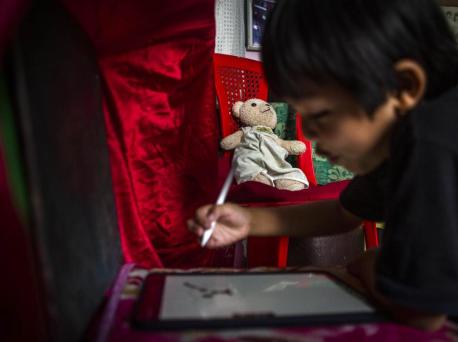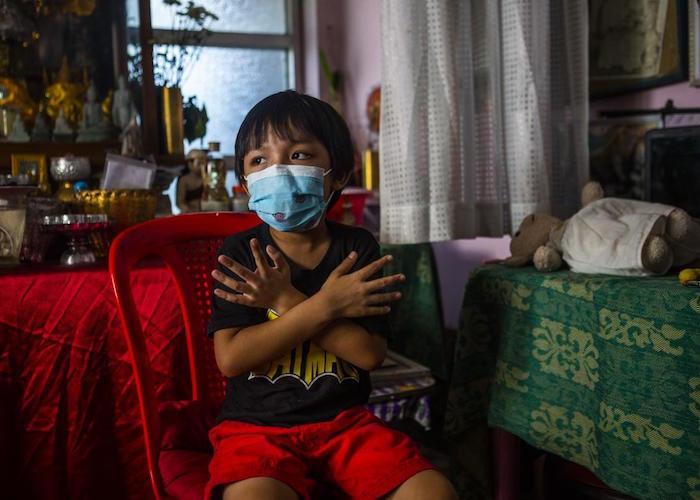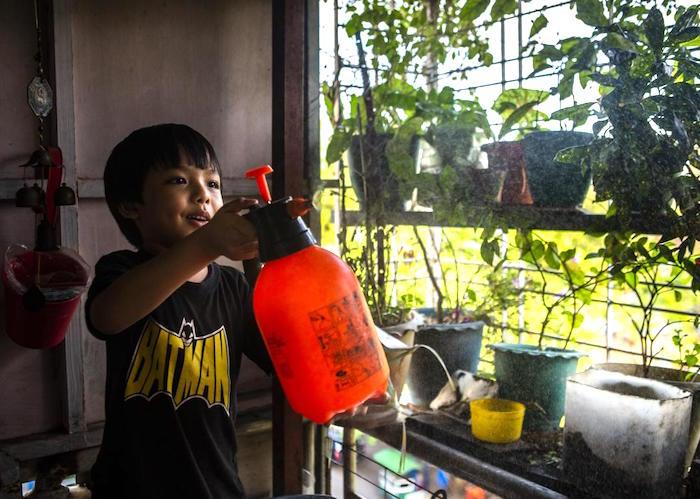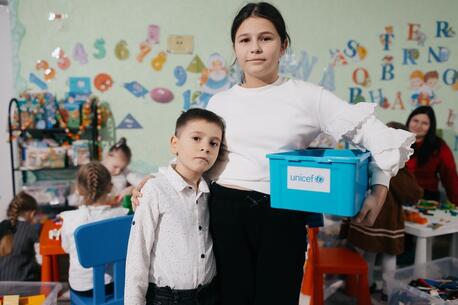
Helping Kids Bounce Back From Pandemic Stress and Isolation in Myanmar
The COVID-19 pandemic has cut off children from friends and school, disrupting their healthy development. In Myanmar, a UNICEF-supported mental health program is helping kids like 6-year-old Hlyan Htet develop resilience and get back on track.
Six-year-old Hlyan Htet keeps close to his mother these days and does not venture far from the family's home in Myanmar. “I have friends, but my best friend is a dog from downstairs," he says matter-of-factly. "We play together every evening."
Although Hlyan Htet’s innocent charm shines through, his mother, Hnin Hnin, says the events of the past two years have taken a heavy toll on her son. “I was having problems in my marriage, then the first wave of COVID-19 came, and then the current crisis unfolded, one after the other.”
My best friend is a dog from downstairs. We play together every evening. — Hlyan Htet, age 6
The COVID-19 pandemic disrupted Hlyan Htet’s early education and socialization. Instead of going to preschool with children his own age, “Mommy taught me at home,” Hlyan Htet says. Fortunately, the family has access to the Internet and he is still excited by the lessons offered online via Zoom.
“I also love drawing,” says Hlyan Htet.

Six-year-old Hlyan Htet demonstrates one of the games he learned from the Little Pyit Tine Htaung program, run by Metanoia. a UNICEF partner mental health services organization in Yangon, Myanmar. © UNICEF Myanmar/Nyan Zay Htet
It's clear that the stresses of growing up during a pandemic, compounded by recent political upheaval in Myanmar, have had a huge impact on the soft-spoken little boy. “My son started having trouble controlling his emotions and became overly attached and clingy to me," says Hnin Hnin. "He gets up with me, since he doesn’t want to be left alone in bed, and, even when I pray, he sits beside me."
He doesn't want to be left alone ... even when I pray, he sits beside me. — Hnin Hnin, mother of 6-year-old Hlyan Htet
Hlyan Htet is not alone in his distress. COVID-19 has left 12 million children out of school for over a year and the current political crisis is further undermining their mental health and psychosocial well-being. Many have witnessed violence and attacks, and some have been victims, leaving them mentally, if not physically, scarred.
In response to the issue of pandemic stress and isolation, UNICEF and its partners have been expanding psychosocial services for children and young people in Myanmar. This includes individual counseling, peer-support groups for adolescents and young people, and a national mental health and psychosocial advice helpline for children, which is available in several ethnic languages. Since the beginning of 2022, a total of 53,332 people, including 36,258 children, have accessed critical child protection services nationally — including mental health and psychosocial support — through 28 partner organizations.
In July 2021, Hlyan Htet started participating in one of the virtual psychosocial activities, Little Pyt Tine Htaungs, named after one of Myanmar’s traditional brightly colored egg-shaped toys — similar to roly-poly Weebles in the U.S. — that always stand upright no matter how they land.

In the evenings, Hlyan Htet helps his mother water the family's plants at their home in Myanmar. © UNICEF Myanmar/Nyan Zay Htet
Hnin Hnin found this service on the Facebook page of UNICEF partner Metanoia, a mental health services and resource center in Yangon. One of Metanoia’s staff explains the process: First, virtual helpline operators register participants and explain the activities on offer. Children ages 7 and over fill out pre-assessment and post-assessment forms, or a caregiver completes the forms on their behalf if the child is under the age of 7.
The three-day sessions are adapted to three age groups: 4–12 years, 13–17 years and 18–29 years. The younger children “learn to understand emotions and empathy, respect and boundaries, and identity while doing arts and crafts activities,” says the Metanoia staff member. The older age groups focus on “understanding reactions to crisis, practicing stabilization techniques, promoting a sense of safety, maintaining hope, staying connected and strengthening efficacy to overcome crisis.”
For younger children, a focus on emotions, empathy, respect and boundaries. For older youth, reactions to crisis, maintaining hope and staying connected
After group sessions, participants are usually offered a counseling session. “We request that parents give [their children] personal space during these sessions. We will then talk with parents, and sometimes we find it’s them who needs therapy, not their child,” says the Metanoia staff member.
Hnin Hnin says, “It’s really great and I’ve been recommending it to everyone.” She says that single parents like her are struggling with raising children during these times of crisis.
Both Hlyan Htet and his mother also received individual therapy sessions from a counselor. “He got close to the counselor,’ says his mother. “He was even asking me about her since he dreamt of her.”
After several sessions, Hnin Hnin reports that her son is showing signs of improvement. “He has gained more control [over his emotions], except that he still won’t let me disappear from his sight,” she says.
UNICEF works with partners around the world to help children grow up healthy and happy so they can reach their full potential. Your contribution can make a difference. Please donate.
Top photo: Children and young people in Myanmar, like 6-year-old Hlyan Htet, are showing the strains of growing up during the COVID-19 pandemic and political unrest. UNICEF and its partners are scaling up psychosocial services to reach those in need. © UNICEF Myanmar/Nyan Zay Htet


